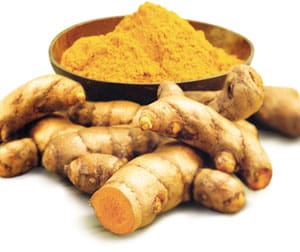Scientists discover benefits of Turmeric in curry dishes.

RECENTLY, Turmeric (curcumin), a bright yellow coloured curry spice in Asian cooking has been grabbing the headlines for its ability to prevent many diseases.

A growing body of research indicates that curcuminoids, the active components in Turmeric, could be used to prevent a wide range of illnesses, from colorectal cancer to Alzheimer’s disease to arthritis and skin disorders.
Studies have shown that curcuminoids have antioxidant, anti-inflammatory and cholesterol-lowering properties. It is a natural COX-2 inhibitor for relieving pain and a promising anti-cancer agent. Scientists have also noted that curcuminoids support healthy blood sugar metabolism and offer a promise to fight diabetes.
Six hundred and eighty-eight studies (with more than 400 of them published within the last four years), have looked at Turmeric’s remarkable anti-carcinogenic, anti-inflammatory, and antioxidant properties.
The US National Institute of Health has four clinical trials to test curcuminoids for colorectal cancer, pancreatic cancer, multiple myeloma and Alzheimer’s disease.
Cancer
Earlier studies suggest that people who eat diets rich in Turmeric have lower rates of breast cancer, prostate cancer, lung cancer and colon cancer.
Bharat B. Aggarwal, professor of cancer medicine in the Department of Experimental Therapeutics at the University of Texas M.D. Anderson Cancer Center, would like to try giving Turmeric to women with a high risk of breast cancer – such as those who have a mother or sister with the disease.
He has studied the spice for a decade, and says that no drug company is likely to develop a natural product that cannot be patented.
He adds: “There are no companies behind it so our only source of funding is either the National Institutes of Health or the Department of Defense,” he said.
Aggarwal’s team is also testing curcumin against pancreatic cancer and multiple myeloma. The research is funded by the US Department of Defense’s Breast Cancer Research Program.
Curcuminoids also blocks a key biological pathway needed for development of melanoma and other cancers, say researchers from the University Of Texas M. D. Anderson Cancer Center.
The study, published in the August 15, 2005, issue of the journal Cancer, demonstrates how curcumin stops laboratory strains of melanoma from multiplying and directs the cancer cells to commit suicide.
It does this, researchers say, by shutting down nuclear factor-kappa B (NF-KB), a powerful protein known to promote an abnormal inflammatory response that leads to a variety of disorders, including arthritis and cancer.
Alzheimer’s disease
Alzheimer’s disease (AD) is considered a form of dementia, a brain disorder that seriously affects a person’s ability to carry out daily activities.
AD primarily involves the parts of the brain that control thought, memory and language. Its causes are still essentially unknown, and currently there is no cure.
AD is characterised by amyloid plaques formed in the brain. Amyloid plaques are clumps of a protein known as beta amyloid. They are found in the tissue between nerve cells in the brain.
Amyloid plaques generate free radicals which cause damage to brain cells. Abnormal production of free radicals causes levels of beta amyloid to increase. This is a vicious cycle in which higher levels of beta amyloid lead to even more free radicals.
Turmeric, a powerful antioxidant, helps to neutralise these free radicals, thus preventing their destructive effects in the earlier stage of the disease. NF-KB causes inflammation, which also contributes to the formation of beta amyloid.
Turmeric has been shown to reduce beta amyloid formation by inhibiting NF-KB. By inhibiting the formation of beta amyloid through its dual mechanisms of protection against inflammation and free radical damage, curcuminoids make a promising natural agent for preventing and slowing the progression of AD.
Joint pain and inflammation
Turmeric has been used for decades to treat inflammatory conditions such as osteoarthritis. The anti-inflammatory action is due to inhibition of NF-KB.
Just recently, curcuminoids, together with a popular drug, celecoxib, a cox-2 inhibitor, was shown to synergistically reduce inflammation. This finding is important because cox-2 inhibitors have possible adverse side-effects. If you combine the treatment with curcuminoids, you could reduce the dose of the drug and lessen its side-effects.
Blood sugar
Scientists have found that curcuminoids have beneficial effects on blood sugar metabolism. Using animals with experimentally induced diabetes, they found that curcuminoids normalised blood sugar levels.
Other researchers found that curcuminoids help relieve free radical damage related to high blood sugar levels, thus preventing some of the complications associated with diabetes.
Poor bioavailability
Turmeric is not soluble in water and it is poorly absorbed into the bloodstream, and once there, it is rapidly metabolised. This may be the reason why most people do not obtain all of curcuminoid’s benefits when taken as a supplement that contains Turmeric alone.
Studies show that when a small amount of piperine, which is extracted from black pepper, is combined with Turmeric extract in a capsule, the absorption of curcuminoids into the bloodstream is dramatically increased by 2000%.
Besides enhancing absorption of curcuminoids into the bloodstream, piperine also helps by inhibiting the enzymes that break down curcuminoids, which makes curcuminoids stay in the body longer in higher quantities for maximum effectiveness.

